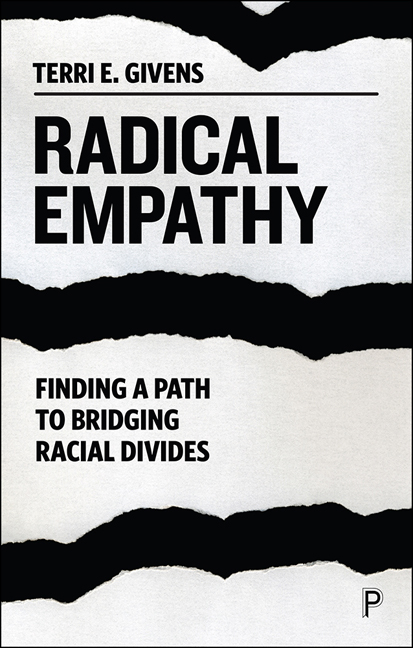Book contents
- Frontmatter
- Dedication
- Contents
- Note on the author
- Prologue:Writing in a time of crisis
- 1 Bridging divides: From racism to empathy in the 21st century
- 2 Getting to radical empathy
- 3 My family’s story: The isolation of internalized oppression
- 4 Racism and health disparities
- 5 Finding empathy in the academy
- 6 Love and marriage
- 7 Radical empathy in leadership: Creating change
- 8 Creating change at the national level: Restorative justice and working off the past
- 9 Revisiting the path to radical empathy
- Epilogue: The long road ahead
- Notes
- Suggested reading
- Index
Prologue:Writing in a time of crisis
Published online by Cambridge University Press: 05 January 2022
- Frontmatter
- Dedication
- Contents
- Note on the author
- Prologue:Writing in a time of crisis
- 1 Bridging divides: From racism to empathy in the 21st century
- 2 Getting to radical empathy
- 3 My family’s story: The isolation of internalized oppression
- 4 Racism and health disparities
- 5 Finding empathy in the academy
- 6 Love and marriage
- 7 Radical empathy in leadership: Creating change
- 8 Creating change at the national level: Restorative justice and working off the past
- 9 Revisiting the path to radical empathy
- Epilogue: The long road ahead
- Notes
- Suggested reading
- Index
Summary
The year 2020 has been full of challenges, but perhaps the greatest challenge has been the onset of the COVID-19 pandemic. It has disrupted every aspect of our lives, and my family has felt the impact of the virus in a variety of ways.
When I got the phone call and heard my sister's voice, I knew what she was going to say—she had gotten the virus. It had been my fear throughout the first month of sheltering in place that a close family member would get the virus, which had proven deadly for so many. For the first few days we did regular check-ins and we were grateful that her case would not require hospitalization. In the end it turned out that she didn't have COVID-19—it was another illness, Valley Fever, which has similar symptoms, in particular pneumonia, and which is also of concern for African Americans.
My thoughts are with anyone who has suffered in any way during the crisis created by the COVID-19 virus. When I started working on this book in the spring of 2019, the world was a different place. Everything changed in the winter of 2020 when the COVID-19 virus forced the world to step back and shut down. I live in the San Francisco Bay area, which was one of the initial hotspots for the virus in the US. Although I had been watching developments with the virus in China, I didn't expect the pandemic to hit so hard and so fast where I live. By early March we were facing shelter in place orders, and on the day that they initiated the stay at home order in my county, I was rushing up to Portland to pick up my son from college. The trip seemed surreal as I felt a constant worry about the possibility of picking up the virus as I drove across California and Oregon.
Luckily, we did not get the virus on our travels, and as I write in September of 2020, my husband, sons, and I have remained safe and healthy (although I have three cousins and many friends who are recovering from the virus).
- Type
- Chapter
- Information
- Radical EmpathyFinding a Path to Bridging Racial Divides, pp. ix - xiiPublisher: Bristol University PressPrint publication year: 2021



